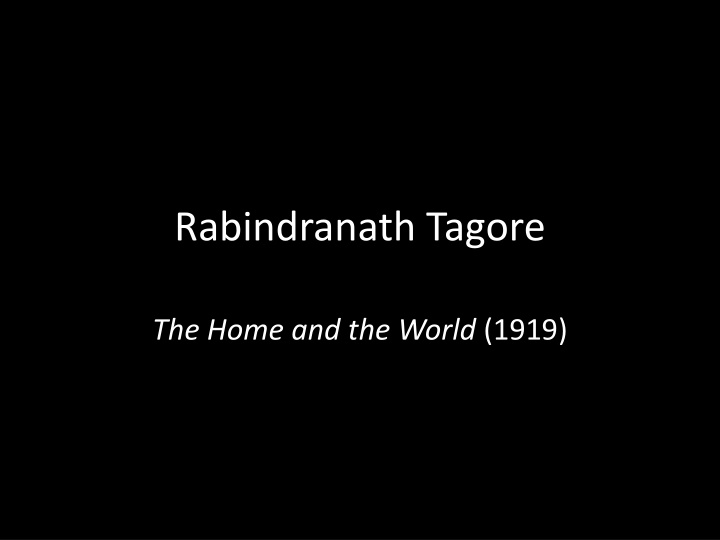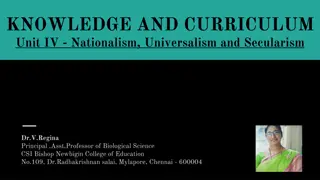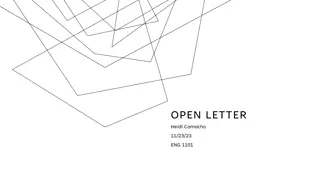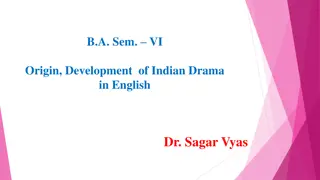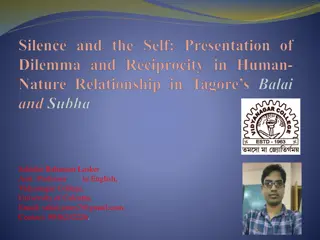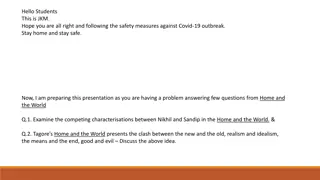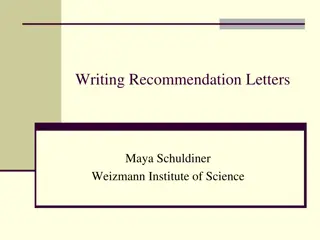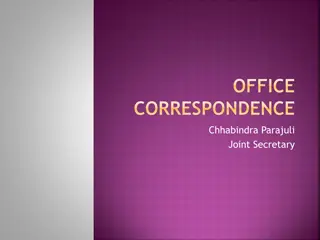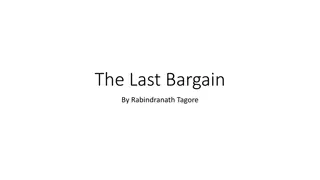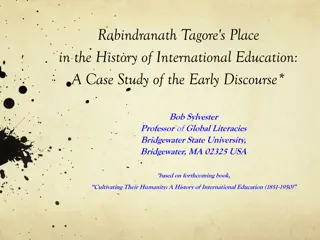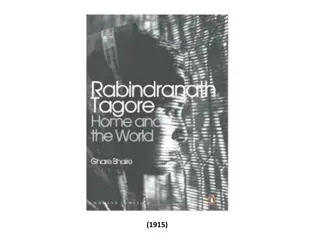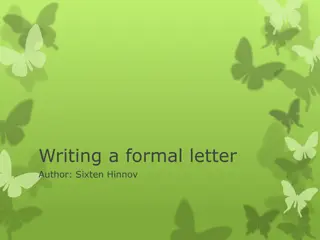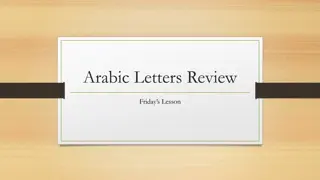Rabindranath Tagore: The Iconic Man of Letters and His Political Stand
Rabindranath Tagore, the Nobel Prize-winning poet, novelist, and painter, was a modernist humanist who criticized extremist nationalism. He founded Viswa Bharati University as a radical educational experiment. The context of his time, including the Jallianwala Bagh Massacre and the Swadeshi Movement, influenced his views on nationalism and internationalism. Tagore's political stance emphasized truth and justice in the anti-colonial struggle, aligning with Gandhi's principles.
Download Presentation

Please find below an Image/Link to download the presentation.
The content on the website is provided AS IS for your information and personal use only. It may not be sold, licensed, or shared on other websites without obtaining consent from the author.If you encounter any issues during the download, it is possible that the publisher has removed the file from their server.
You are allowed to download the files provided on this website for personal or commercial use, subject to the condition that they are used lawfully. All files are the property of their respective owners.
The content on the website is provided AS IS for your information and personal use only. It may not be sold, licensed, or shared on other websites without obtaining consent from the author.
E N D
Presentation Transcript
Rabindranath Tagore The Home and the World (1919)
Tagore 1861-1941 Poet, novelist, painter Iconic man of letters Nobel Prize for literature in 1913 A modernist, humanist and internationalist (anti-imperialist and critic of extremist, violent nationalism) Set up the famous Viswa Bharati University in Santiniketan in 1921, a radical experiment in education Benevolent paternalism: born into an elite Bengali family; landed gentry that combined traditional zamindari (landlordism) with modern education and progressive ideals and politics (rural upliftment). Tagore s father was a leading proponent of the Brahmo Samaj, a reformist Hindu movement) Renounced his knighthood following the 1919 Jallianwala Bagh massacre
Historical background to the novel 1905: Lord Curzon s Partition of Bengal, along communal lines ( divide and rule ) 1905-1908: The Swadeshi movement first popular anti- colonial movement in India that took place in Bengal Extremists and moderates Criticised for being elitist Boycott of foreign goods (cloth imported from Britain that impoverished local weavers) Stirred nationalist sentiment but also aroused communal tension between Hindus and Muslims (middle-class Swadeshi activists and peasants and petty traders)
Tagores politics Tagore s disappointment with extremist nationalist politics (high-handed, misdirected) and its communal colour Nationalism (World War) vs internationalism (universal values of truth, justice and human relationships; culture of diversity; mental growth through cultural contact) Truth and justice as keystones of anti-colonial struggle (anticipated Gandhi)
The Home and the World (Ghare Baire) First serialized in the avant-garde Bengali journal Sabuj Patra in 1915-1916 Serialized in The Modern Review from Dec 1918 Intersection of two sets of preoccupations: global and national/local Tradition and modernity Form: --Traces of the 19thc novel concerns with domesticity, gender relations; self-conscious emphasis on newness that nevertheless was based on tradition novel of ideas intellectual deliberation --Modernist: discontinuity and rupture (Sabuj Patra: shocking and jolting), a stance inimical to preservation of tradition; emphasis on newness Everyday language
Historical rupture Bimala: the new epoch came in like a flood, breaking down the dykes and sweeping all our prudence and fear before it. We had no time even to think about , or understand, what had happened, or what was about to happen. My sight and my mind, my hopes and my desires, became red with the passion of this new age. Though, up to this time, the walls of my home remained unbroken, yet I stood looking over into the distance, and I heard a voice from the far horizon , whose meaning was not perfectly clear to me, but whose call went straight to my heart (26).
Language of modernity Language of modernity: reading and writing (Bimala on writing, p. 19) The making of the self esp. women s choices and desires (women s self-assertion to help build the nation); Nation: created, not inherited; Norms can no longer be taken for granted Individual voice capable of asserting its distinctiveness against the authority of an unjust tradition interiority and psychological depth Women negotiating tradition and modernity within home and marriage, but also creating alternate lives (Tagore s short stories in SP) Modern conjugal love: Nikhil writes letters to Bimala (19); love based not on worship and devotion, but on love and companionship I would have you come into the heart of the outer world and meet reality. Merely going on with your household duties, living all your life in the world of household conventions and the drudgery of household tasks you were not made for that! If we meet, and recognise each other, in the real world, then only will our love be true (Nikhil to Bimala, 23) Public and private intertwined Intersubjectivity as basis of new self
The subalterns Middle-class homes and life collide with the social worlds of the poor and the marginalised (turning point in the novel) Encounter with Panchu and Mirjan changes the course of the swadeshi movement and destroys the already uneasy balance between husband, wife and lover
Gendering modernity Women as individual subjects negotiating tradition and modernity Women s role in building the nation goddess and the everyday woman Politics and desire merging of the erotic and the nationalist Setting up a conjugal home in the city
Bimala: ideal wife/modern woman Bimala: imagining different possibilities Traditional heroine of Hindu revivalism who is also modern ideal wife (devotion) led into modernity by her progressive husband Everyone says that I resemble my mother. In my childhood I used to resent this. It made me angry with my mirror All that remained for me to ask of my God in reparation was, that I might grow up to be a model of what woman should be, as one reads it in some epic poem. When the proposal came for my marriage, an astrologer said, This girl has good signs. She will become an ideal wife (17). Literate; reads stories from English books to the grandmother; writes: self-representation Public role for domestic virtues; wife and nationalist icon Self-assertion, but becomes an instrument for male power return to Nikhil : shot through with ambiguity
Nikhil and Sandip Nikhil: a wealthy landowner who is modern (cf. his brother s addiction to alcohol; women and song) educated in the city, rational, benevolent, decent, believes in equality b/w men and women in conjugal life and love (Bimala is not beautiful); in women s education; modern dressing bought from European shops; modern house Desire to take wife to the threshold of the home and the world His suffering gender dimensions; to be so good is not to be entirely manly (22) Looks at himself through Bimala s eyes Possibilities and limits of male reformism Sandip: fiery revolutionary for whom ends justify the means; charismatic but unscrupulous Novel mounts a critique of his nationalism based on ideas of divinity The erotic: test of his power (control over women/control over life) Bimala confirms his power (even as he is servile towards her) Masculinity at the heart of his nationalism Lives on Nikhil s patronage does not work Confronts his lack through violence
Subordinate characters Figure of Miss Gilby: transnational feminism Brought in by Nikhil to teach Bimala and to be her companion I had never bothered myself before whether Miss Gilby was European or Indian, but I began to do so now. I said to my husband, We must get rid of Miss Gilby . I cannot look upon Miss Gilby through a mist of abstraction, just because she is English (28). Panchu and Mirjan: challenge the self-absorbed nationalism of Sandip; problems of livelihood and social difference
